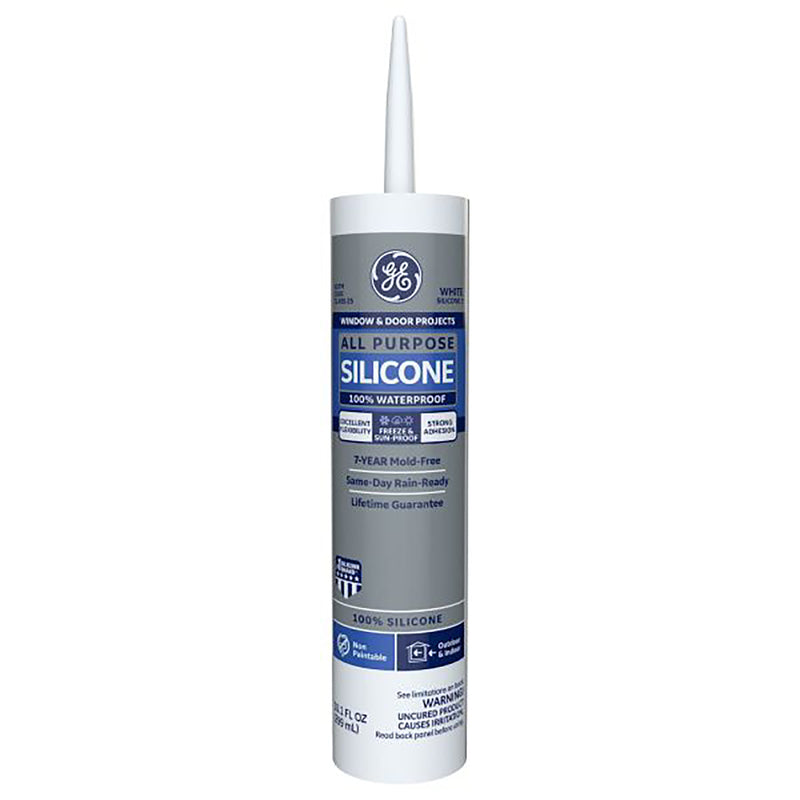Views: 33
Dap and GE Silicone are both popular brands of sealants used for various applications. Dap is known for its affordability and versatility, while GE Silicone is recognized for its high-quality and durability.
Sealants play a crucial role in providing a watertight and airtight seal for various projects. When it comes to choosing the right sealant, two prominent brands that often come up in discussions are Dap and GE Silicone. Dap is a budget-friendly option that offers versatility, making it suitable for a wide range of applications.
On the other hand, GE Silicone is renowned for its superior quality and durability, making it a popular choice for demanding projects.
We will compare Dap vs GE Silicone to help you make an informed decision based on your specific needs and requirements. So, let’s dive in and explore the similarities, differences, and unique features of these two sealant brands.
Contents
Comparing Dap And Ge Silicone
When it comes to choosing the right sealant for construction projects, decision-making can be challenging given the variety of options available.
Two popular choices are DAP and GE Silicone, both of which offer unique features and applications. Let’s delve into the specifics of each to understand how they differ and where they are best utilized.
Composition Differences
DAP: DAP sealants are typically acrylic-based, offering flexibility and paintability. They are ideal for indoor use and general-purpose sealing applications. The composition of DAP sealants provides a durable, long-lasting seal.
GE Silicone: GE Silicone sealants are formulated using a silicone-based compound, offering excellent adhesion and water resistance. These sealants are better suited for outdoor applications and areas exposed to moisture due to their superior durability and weather resistance.
Applications In Construction
- DAP sealants are commonly used for sealing interior gaps, cracks, and joints in construction, providing a versatile solution for indoor projects.
- GE Silicone sealants excel in outdoor applications such as sealing windows, doors, and external joints, offering reliable protection against harsh weather conditions and moisture intrusion.

Composition
When it comes to choosing the right silicone sealant for your project, understanding the composition of the product is essential.
In this section, we will explore the chemical makeup of DAP and GE Silicone, two widely used silicone sealants in construction and home improvement projects.
Chemical Makeup Of Dap
The chemical makeup of DAP (Dow Corning) silicone sealant includes acetic acid, which gives it a distinct vinegar-like odor during application.
This type of silicone, commonly referred to as “acetoxy cure” or “acid cure” silicone, requires exposure to air for the acetic acid to evaporate, forming a durable rubber seal.
The primary components of DAP silicone sealant also include silicone polymers and various fillers and additives for specific performance properties.
Chemical Makeup Of Ge Silicone
GE Silicone sealants are formulated using a different approach, employing a neutral cure technology. The chemical makeup of GE Silicone primarily consists of silicone polymers, and the curing process does not release acetic acid.
Instead, it releases alcohol or oxime as by-products, resulting in a virtually odorless curing process. Additionally, GE Silicone sealants may contain various additives and fillers to enhance specific properties such as weather resistance, adhesion, and flexibility.
Performance
Durability Of Dap
DAP sealants are known for their excellent longevity due to their tough and durable formulation.
Durability Of Ge Silicone
GE Silicone delivers proven durability over time, making it a reliable choice for long-lasting seals.

Flexibility And Adhesion
When it comes to choosing the right silicone adhesive for your project, two popular options in the market are Dap and GE Silicone. While both brands offer high-quality products, it’s essential to understand their differences to make an informed decision.
One crucial aspect to consider is the flexibility and adhesion of the silicone adhesives. In this section, we will compare the flexibility of Dap and GE Silicone, as well as their adhesion strength, so you can choose the one that best suits your needs.
Flexibility Comparison
Flexibility is a vital characteristic of silicone adhesives. It determines how well the adhesive can withstand movement, expansion, and contraction without becoming brittle or breaking apart. In terms of flexibility, both Dap and GE Silicone are excellent choices.
Dap Silicone is known for its exceptional flexibility, allowing it to maintain a strong bond even in applications subject to frequent movement or extreme temperatures. Whether you’re working on a construction project or a DIY craft, Dap Silicone provides the flexibility needed for long-lasting results.
On the other hand, GE Silicone is equally impressive in terms of flexibility. It is designed to withstand the stresses caused by thermal expansion and contraction, making it an ideal choice for sealing outdoor areas, such as windows and doors.
With GE Silicone, you can be confident that your adhesive will flex and adapt to the changing conditions without losing its bond.
Adhesion Strength Analysis
Another crucial factor to consider is the adhesion strength of the silicone adhesive. Adhesion strength determines how well the adhesive bonds to different surfaces, ensuring a durable and reliable connection.
Let’s examine the adhesion strength of both Dap and GE Silicone.
| Dap Silicone | GE Silicone | |
|---|---|---|
| Excellent Adhesion | ✓ | ✓ |
| Adheres to various surfaces | ✓ | ✓ |
| Long-lasting bond | ✓ | ✓ |
| Water and weather resistance | ✓ | ✓ |
Both Dap Silicone and GE Silicone offer excellent adhesion strength. They have been designed to bond effectively with a wide range of surfaces, including glass, metal, plastic, and wood.
Whether you’re sealing a shower enclosure or installing weatherstripping on your windows, both adhesives will provide a long-lasting bond that can withstand exposure to water and changing weather conditions.
In conclusion, when it comes to flexibility and adhesion strength, both Dap and GE Silicone are top-notch options.
Their flexibility allows them to withstand movement and changing conditions, while their excellent adhesion ensures a durable bond on various surfaces.
Choose the brand that aligns with your project’s specific requirements, knowing that either choice will deliver reliable results.
Weather Resistance
When it comes to sealants, weather resistance is a crucial factor to consider. Whether you are working on a construction project, doing some repairs, or simply sealing gaps and cracks around your home, you need a sealant that can withstand the elements.
Resistance To Water
Both DAP and GE Silicone offer excellent water resistance. Their formulations create a watertight seal that prevents moisture from seeping into the applied area, helping to ensure long-lasting results.
With DAP sealants, you can trust that your surfaces will remain protected even in wet environments. Their products are designed to repel water, keeping it from penetrating through the sealant and causing damage.
GE Silicone sealants are also known for their exceptional performance in wet conditions. Their advanced formulas create a barrier that effectively blocks water intrusion, preventing potential issues such as mold or mildew growth.
Resistance To Uv Exposure
When it comes to outdoor applications, resistance to UV exposure is vital. Both DAP and GE Silicone offer sealants that are formulated to withstand prolonged exposure to sunlight.
DAP sealants contain UV inhibitors that help prevent yellowing, cracking, and weakening due to sun exposure. This makes them a reliable choice for outdoor projects, such as sealing windows, doors, or siding.
GE Silicone sealants also feature UV-resistant properties, allowing them to maintain their integrity and effectiveness in high-exposure areas. Their sealants are specially engineered to resist degradation caused by UV rays, ensuring long-lasting protection.
In summary, both DAP and GE Silicone sealants provide impressive weather resistance. Their formulations excel in withstanding water infiltration and protecting against UV exposure, making them suitable choices for various indoor and outdoor applications.

Ease Of Application
When considering the ease of application between DAP and GE Silicone, the application methods play a crucial role in determining the user-friendliness of the products.
Application Methods For Dap
DAP sealants are commonly applied using traditional caulk guns, making them accessible and easy to use for DIY enthusiasts.
Application Methods For Ge Silicone
GE Silicone offers a range of application methods, including squeeze tubes and caulking guns, providing versatility based on the user’s preference.
Cost-effectiveness
Dap and GE Silicone offer cost-effective solutions for various applications, with a focus on durability, easy installation, and long-term performance. Both brands provide high-quality products that deliver excellent value for money.
Whether it’s sealing gaps or securing materials, Dap and GE Silicone offer reliable and affordable options.
Cost-effectiveness plays a crucial role in determining which silicone sealant is the right choice for your project. When it comes to comparing DAP and GE silicone, analyzing the cost-effectiveness will help you make an informed decision about the best investment.
Price Comparison
Before making a choice between DAP and GE silicone, it’s important to compare the cost of both products.
DAP silicone typically comes at a slightly lower price point compared to GE silicone, making it an attractive option for those working within a tight budget.
However, GE silicone’s higher price may be justified by its durability and long-term benefits.
Long-term Cost Benefits
In terms of long-term cost benefits, GE silicone stands out for its superior quality and performance. Although it might have a higher initial cost, GE silicone’s durability and resistance to weathering can lead to cost savings in the long run.
Additionally, its exceptional adhesion and flexibility can reduce the need for frequent replacements or repairs, ensuring long-term cost-effectiveness.
When comparing DAP vs. GE silicone in terms of cost-effectiveness, it’s essential to consider not only the initial price but also the long-term benefits and potential savings.
While DAP may be a more budget-friendly option upfront, investing in GE silicone could lead to significant cost savings and superior performance over time.
Environmental Impact
The environmental impact of construction materials is a critical consideration in today’s eco-conscious world. When it comes to sealants like DAP and GE Silicone, understanding their eco-friendliness is essential for environmentally responsible decision-making.
Eco-friendliness Of Dap
DAP offers a range of sealants that are formulated to have minimal environmental impact.
Through their commitment to sustainability, DAP has developed low-VOC (volatile organic compound) and low-odor formulas.
These sealants contribute to healthier indoor air quality and reduce the release of harmful pollutants into the environment.
- Low-VOC and low-odor formulas
- Healthier indoor air quality
- Reduced release of harmful pollutants
Eco-friendliness Of Ge Silicone
GE Silicone also prioritizes eco-friendliness in its sealant products. Their silicone sealants are designed to be long-lasting, reducing the need for frequent replacements.
This longevity minimizes waste and the consumption of additional resources for manufacturing and disposal.
- Long-lasting formulation
- Reduction of waste
- Minimized resource consumption
Frequently Asked Questions On Dap Vs Ge Silicone
Is Dap Or Ge Silicone Caulk Better?
DAP and GE silicone caulk have similar performance, but GE is known for better durability and flexibility.
Is Ge Silicone Any Good?
Yes, GE silicone is a reliable and high-quality product. It offers strong adhesion and excellent waterproofing properties.
Is Dap Amp Better Than Silicone?
DAP Amp provides better adhesion and durability than silicone. It is also paintable and has a faster curing time.
Who Makes Ge Silicone Caulk?
GE Silicone caulk is manufactured by Momentive Performance Materials, a global company specializing in silicones and advanced materials.
Conclusion
Choose the right silicone for your project based on specific needs and application requirements. Consider factors like flexibility, durability, and temperature resistance.
Both DAP and GE Silicone offer quality options to meet various sealing and bonding needs. Make an informed decision for successful project outcomes.
